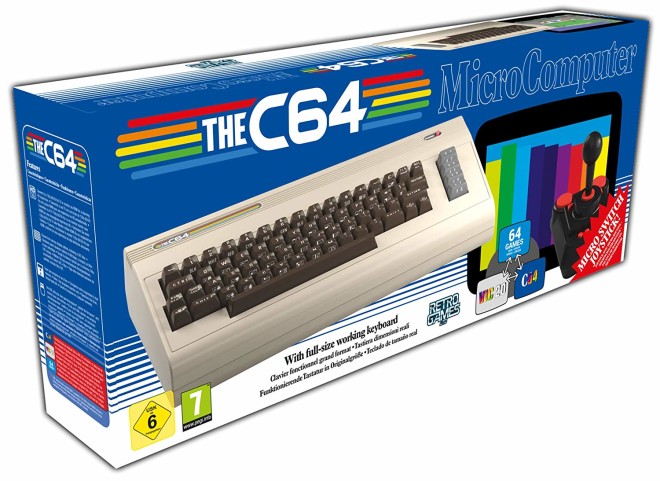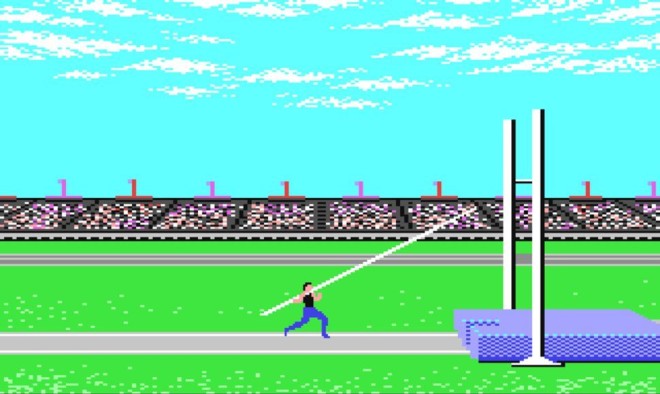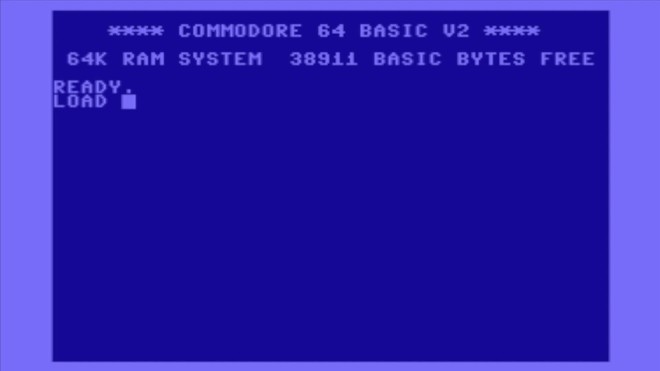Some experiences are exceptionally formative. I had one of them on my birthday in 1985, when my heart was racing as I opened my presents. An elongated box immediately caught my eye. I tore it open and stared at the magic letters that said Commodore C64 MicroComputer. A bunch of disks and two joysticks were also included. It was a life-changing moment! This intriguing "bread box" would teach me the value of patience and the fundamentals of the BASIC language. The fascination for technology and the drive to explore I felt that day would take a firm hold and stay with me for the rest of my life. Now, the C64 is back, kind of. Same design but contemporary hardware. Naturally, I had to try out this homage to a milestone of home computing.

Though age has left its mark on me, I still feel a joyful anticipation as I open the (new) box. Perhaps it'll bring back some of the old magic? The packaging, though lacking the original lettering, is as true to history as can be and the computer itself is a full-sized replica with a working keyboard. The weight is a little off and key travel differs from the original but, all in all, the manufacturer has done a decent job of faithfully reproducing both size, weight and visuals. The famous Commodore logo is woefully absent, but I'll take care of that! Other package contents: A booklet (with quick start instructions), power supply unit and a low-quality HDMI cable that refused to work with my displays.
On to the most important accessory: the joystick. And let's face it: Nothing beats the original Competition Pro in terms of sturdiness, precision and sound. Still, the included replica features micro switches and was apparently built to withstand even joystick killers, like Summer Games. THE C64 Maxi is USB-only so all you veteran home computing fans out there won't be able to plug in your original joysticks or other peripherals (floppy drive, Datasette etc.). But fret not, at least as far as joysticks go, since there are modern USB-compatible replicas of many fan-favorites available at various quality levels and price points. So far, two weeks of passionate gaming haven't affected my Competition Pro replica in the slightest. We'll see how well computer and joystick will hold up in the long run.
As mentioned before, THE C64 Maxi comes with USB ports for peripherals and an HDMI port for display connectivity. This machine is not an exact replica of the original but an emulator housed in a case that closely resembles the cult classic. This becomes especially apparent once you open it up (I just had to look inside!). There's a lot of unused space, which makes perfect sense seeing as, by today's standards, the computing power offered here is dwarfed by the cheapest of pocket calculators. Enough talk about visuals, let's hook it up and take it for a spin. I am greeted by a nice logo that says "Retro Games THE C64" and prompts associations to glorious times past. Afterwards, a common carousel style interface takes over and gives way to the 64 pre-installed games. As I browse through the collection, I'm presented with title, synopsis, release date, author(s) and genre for each game. Nice!
 Every joystick's nightmare: Summer Games
Every joystick's nightmare: Summer Games
And then there's Classic Mode which sports the familiar light blue on dark blue design along with the glorious 38911 BASIC BYTES FREE message. Suddenly, I see my past self again, wearing tennis socks and watching Knight Rider while Boris Becker wins Wimbledon. Classic Mode not only comes with the design but also the limitations of the original machine: No RAM or software upgrades have been applied, everything is exactly as it was when Bill Gates still had long hair. This faithful reproduction of the past can be either a good and a bad thing, depending on your expectations. I'm pleased to say my Hello World program works flawlessly but I don't have time for a deeper dive into the innards of the BASIC language. You won't find instructions, let alone a tutorial, in the booklet (which some reviewers pointed out as a flaw) but, if you're interested in BASIC, there's plenty of documentation available online.
As for the games: There are 64 in total, including favorites like Boulder Dash, Cyberdyne Warrior and Impossible Mission. But, as with all pre-packaged emulators, there are always one or two important games missing. The good news is that, this being an emulator, the system reads ROM images of C64 games in the popular D64 or T64 formats from USB drives, provided the drives are formatted as FAT32 volumes. D64 worked better in my tests, even for multi-volume games, and loading times were acceptable. Not all games work flawlessly though. To be fair, the manufacturer is still working on game compatibility so this situation can only improve over time. In any case, the current firmware is already a major improvement over the disastrous firmware available at launch.
I recommend using THE C64 Maxi with smaller screens because, even though it supposedly outputs 720p, the now super-crisp, but still low-res, C64 graphics were never made for the giant TVs of today. To be honest, they already looked blocky on the much smaller displays from several decades ago. Displays up to 32'' are a good match. If you want to push nostalgia to the limit, use a CRT display. Important: Make sure your display has a built-in HDMI port or use a high-quality converter. Cheap adapters likely won't work. After all, this is an emulator for an anything but flawless legacy system—but it gets the job done fairly well under the circumstances.
 Basic mode—and my heart is jumping with joy
Basic mode—and my heart is jumping with joy
Want more retro feeling? Switch to VIC-20 mode. This, also legendary, predecessor has a smaller fan base but supports timeless classics like Asteroids, Choplifter and Pac-Man in even more rudimentary form! For me, the C64 mode perfectly takes care of all my retro gaming needs.
THE C64 Maxi is the finest piece of 8-bit technology I've come across in a long time. For around €120, you get the chance to (re)discover past gaming highlights complete with that warm fuzzy feeling of nostalgia a plain PC-based emulator can never hope to achieve. And nostalgia really is the operative word here. If you've never owned a C64 (or similar device), you may be having a hard time comprehending both the allure of the the product and this article. But if you owned, or still own, the famous bread box, and showed up in school dog-tired on more than one occasion because you just couldn't let go of that one Turrican II level, you'll have a whale of a time with this one. It's a blast from the past when technology seemed magical and not just an everyday thing that comes with smartphones, Netflix and the internet.
Addendum: I just noticed THE C64 Maxi is mostly sold out now, with the usual overpriced offers now creeping up on eBay etc. Be patient and make sure to also check smaller sites. I'm sure production of additional units is already under way.
What I would like to know: Did you own a C64 or one of the other popular home computers?
Editorial guidance: Petra Schwarze




Hi, I still have original, working C64 ,joy sticks,discdrive and monitor and casette deck....this story will probably make me want to dig it out of the dusty attic(actually under house) and try to sysrec or load or even run geos on my wotking c128....oh how times have changed...when the ibm, running an 8086 processor could only bleep and buzz, the c64 had SAM and could actually talk,sing (although not very well!) and also play music, I have tubular bells on a disc....wonder if it will load after all this time? Original svid monitor bit the dust. Regards and happy c64ing and don't cry too much at the memories!, I'll try not to! Rob.
Hello Sven - I also remember those days - my first computer was a TRS80 affectionately known as TRASH 80 with a casseste, yes cassete, drive. It also had some good games. times have changed but it has been fun watching all the development. Thanks for the nostalgia. My use of computers has mostly been for work and its sad to see that alot of todays computers ecome targets for collecting jun k mail etc.
Hi Sven, Yes I was a C64 owner and it was the beginning of a new era when the C64 hit the world along with the other first computers. I tried many things but in the end I settled on one game and that was Elite which a group of us use to spend many a gathering after playing to discuss the problems and solutions and general game play. It was actually a fun time though looking back now it was so simple compared to todays version. Great article as usual.
I bought an 32k Exidy Sorcerer in 1981, cost an arm and a leg, but I loved it. It used the Zilog Z80 processor which was fast for that time. Built a green screen monitor for it, and wrote a small assembler program to drive a lower case only dot matrix printer. Wrote heaps of programs with its Microsoft 8K BASIC plug-in cartridge.
Unfortunately it suffered from heat problems which would make saving and reading from its cassette tape back-up very unreliable. Eventually retired it and bought an Apple Macintosh.
I learnt a lot about programming then, enough to enjoy programming to this day.
Yes, I owned the old Vic20, and later the Commodore64 . What really sticks in my mind however is the old 1541 Disk drive Drive and the clatter when reading protected software Floppy Disks. I also remember my first attempts at BASIC programming. The Computer magazines in those days printed complete programs that had to be typed before one could run them.
I really must thank you for the review, my claim to fame was that i was a programmer & musician for the C64 from 82 to 93 and my first release was Invaders 64. I still own my original 64 but i did get the maxi because of the full size working keyboard and it works pretty much as the real 64.
Just for pure nostalgia i ran my orignal code for Invaders 64 onto the maxi and was very surprised just how accurate it was, for an emulator it works better than most as they always run too fast but this is very close indeed.
For anyone who had a 64 back in the day the maxi will bring all those memories back and for new gamers this is a great way to get into retro gaming, it's a blast.
The C64 was good but the big computer of the era was the BBC 32K because it was used throughout schools and educational environments. It used the old 6502 processor and the speed of its computations, given the clock speed, led to the development of RISK processors.
BBC Basic's introductory use of Procedures and Functions was fairly close to Python as a language too.
I was a ZX Spectrum fanatic in the 80’s. Somehow the Commodore 64 did not quite cut the chase for me. The Spectrum’s rubbery keyboard with its multi-finger presses for the Spectrum BASIC commands was a truly unique experience, albeit that took some time to become proficient. Another fond memory was the squawking sound of a regular tape recorder slowly and frustratingly uploading programs such as Jet Set Willy, The Hobbit and Tornado Low Level (TLL). It was however the upgrade challenge of the ZX Spectrum that never ever quite concluded.
First came the upgrade of the ZX Spectrum RAM from 16K to 48K (both infinitesimal in today’s terms), the weird ZX Printer on its narrow rolled silver paper, the ZX Interface 1 for expanded connections enabling a connection to an Epson Dot Matrix (wow), the continuous tape Microdrive for faster program loading, the "conventional" key board, a Joystick for games, a colour Monitor for improved clarity compared to the then crappy TV display and then finally TWIN floppy drives for the really fast loading of programs.
The associated Spectrum magazines were to be poured over and bought every month with their BASIC programs to type in laboriously, until you could not but help learn Spectrum BASIC and then came the adapting of BASIC programs from a host of other computer magazines, such as the likes of Byte (then the magazine only for computer fundis*).
The local Sinclair User Group with its regular monthly meetings to share knowledge and its internal magazines was another aspect to treasure in looking back. The “black art” of machine code was displayed on the Spectrum by some experts at these meetings.
The Spectrum was seem largely by many as a games machine, but is had its Vu-Calc and Tasword for a spreadsheet and word processing.
Sadly, in retrospect, one day I acquired a Taiwanese model IBM Compatible and a new chapter commenced with its own upgrade cycle of both machines and software which has continued to this day. No more programming necessary now and with initially Lotus 123 and WordPerfect as a spreadsheet and word processor.
Also sadly today the once voluminous computer magazines are now extremely thin on the ground and if found, are largely for gamers.
Other than for the ZX Spectrum, the UK was also home in the 80s to the likes of the Amstrad and the BBC Micro computers. Will this happen again after Brexit with its “great opportunities”? I very much doubt it!
P.S. Apologies for hi-jacking your Commodore 64 tribute! It was also a great machine.
* Experts
My first computer was a VIC-20: 5K of RAM (1.5K available), audio cassettes for program/data storage, 54 baud dial-up modem, 25 lines by 23 characters on the TV display, Kernel graphics system. I was never able to do whatever I wanted to do, but I always found out why I couldn't do it, and 90% of the time, it came down to the Kernel graphics. At that time, I lived 3 miles from Commodore's headquarters and it was agonizing that I couldn't get up enough money for the C-64. (The VIC-20, as I recall, was about $300.)
I was a sinclair type with zx81, spectrum and QL. Although I was already working in the software industry I learnt a lot from the zx81 and used the spectrum as a practical home computer. The QL had a lot of potential but somehow I didn't have the time or enthusiam to do as much as I had hoped to: perhaps by then a home machine was too close in seriousness to the big machines (or by then small machines) at work?
I remember those wonderful Saturday personal computer fairs where we would go to look at the latest add ons for our machines, and always spend too much. Talking of prices in today's terms we spent a fortune on those early home computers, many times the amount I am prepared to pay today for a mobile phone. Happy days!